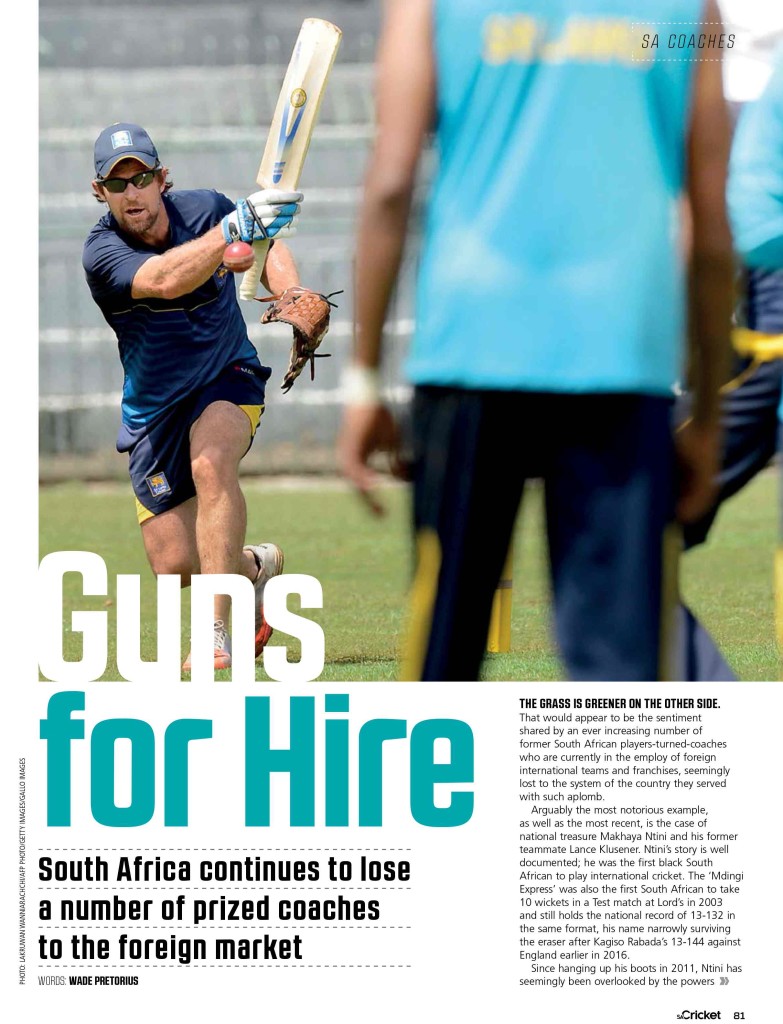With the likes of Rob Walter and HD Ackerman pursuing coaching careers overseas, is the ‘brain drain’ becoming an issue of concern for SA? We discuss it in the latest edition of SA Cricket magazine, which hit the shelves earlier this week.
The grass is greener on the other side. That would appear to be the sentiment shared by an ever increasing number of former South African players-turned-coaches who are currently under the employ of foreign international teams and franchises, seemingly lost to the system of the country they served with such aplomb.
Arguably the most notorious example, as well as the most recent, is the case of national treasure Makhaya Ntini and his former teammate Lance Klusener. Ntini’s story is well documented; he was the first black South African to play international cricket. The ‘Mdingi Express’ was also the first South African to take 10 wickets in a Test match at Lords in 2003 and still holds the national record of 13-132 in the same format, his name narrowly surviving the eraser after Kagiso Rabada’s 13-144 against England earlier in 2016.
Since hanging up his boots in 2011, Ntini has seemingly been overlooked by the powers that be in South African cricket and has been forced to look elsewhere for work, much like in his playing days he has not been shy of a facing up to a challenge and now finds himself in charge of neighbours Zimbabwe.
Working alongside Ntini is former Dolphins coach Klusener who was unceremoniously shown the door by his franchise despite success in the 2013-14 edition of the Ram Slam T20 Challenge – a decision that left him shocked and disappointed. ‘I am a proud son of the soil of KwaZulu-Natal and I have relished every moment of coaching the Sunfoil Dolphins.’ Klusener said at the time. A proud son that will now pour his time, effort and invaluable experience into a set-up outside of the borders of the country he represented 220 times across all formats.
Another famous Protea currently ‘lost’ to the system is Jonty Rhodes. The 46-year-old has previously had a stint as fielding coach prior to the 2007 World Cup but now finds himself working full-time for the Mumbai Indians in the IPL, where he has remained enormously popular since he retired in 2003. Such is his love affair with India, that he name his second child after the country.
Rhodes hints at a link between the number of coaches working outside of South Africa and the timing of their international careers. ‘I think that the coaches who are working out of the country are guys who were either full-time cricket players in the early 90’s like Allan Donald, still studying in the early 90’s like myself, or guys who came into the national team around the mid-to-late 90’s and then played out their careers before the IPL,’ Rhodes tells SA Cricket magazine.
‘Although, you would also need to take into account many of the players who went into commentary after retiring from the game, along with their various business ventures.’ Several of his former teammates have opted for work as commentators including Fanie De Villiers, Pat Symcox and Kepler Wessels, while Shaun Pollock, HD Ackerman and later Paul Harris are just three examples of how players from the younger generation have followed that same path instead of extending their experience of the game towards coaching.
The Pietermaritzburg-born mentor is uncertain as to whether the South Africans currently plying their trade abroad will return to boost the skills development of their country of birth by allowing the game to prosper from the experience gained from their time overseas.
‘I suppose this depends on how many coaches return to the SA environment, either with the Proteas, or at a domestic level. I am not sure how they would retain us – as there are a limited number of coaching berths available in SA,’ continues Rhodes.
‘Both Gary [Kirsten] and AD [Donald] have already worked with the Proteas, and I did a stint with them as fielding coach leading into the 2007 World Cup. CSA have taken great strides to reach their transformation targets, and this also applies to coaches in the structure, locally and with the Proteas.’
The rise and rise of T20 cricket around globe and the lucrative deals they bring for players has bubbled over for the coaching staff too – a factor that Rhodes believes should not be overlooked when assessing the current coaching drain South Africa is experiencing.
‘I think that it’s a combination of finances and work opportunities; most international coaching assignments are contracted with a US dollar-based remuneration, and due to the numerous T20 leagues taking place around the world, there is ample scope for working assignments away from home.’
Cricket’s expansion over the last decade has necessitated a global outlook from administrators and fans alike where resources, players and coaches are freely transferable and increasingly difficult to tie down with the struggling local economy. This trend however may have an upshot in the not-too-distant future, even if it hasn’t been masterminded by CSA themselves who have a penchant for employing consultants on short-term deals.
With no clear plan in place to bring some of the coaching talent back into the national fold, it appears likely that more coaches are likely to do their grooming away from South African shores.
The experience picked up by some of South Africa’s most famous exports may prove to be yet be utilised, although somewhat inadvertently if the current haphazard consultant-based approach is to continue, allowing the national team to in some way reap the benefit of the many former stars scattered around the world.
Written by Wade Pretorius – a senior sports writer at Highbury Safika Media.







